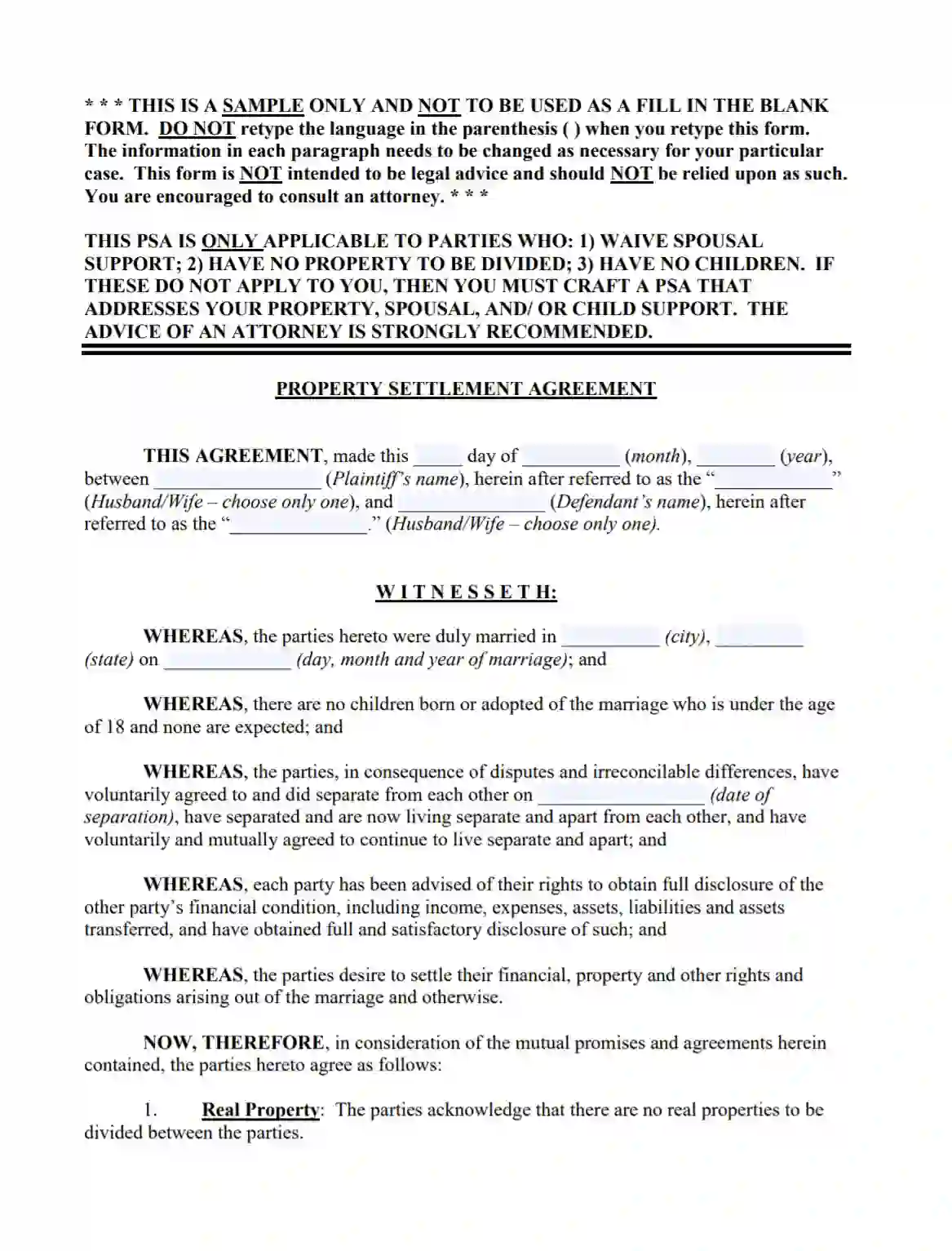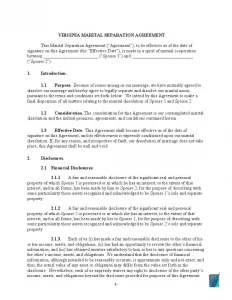Virginia Marital Settlement (Divorce) Agreement and Legal Separation
When couples get married, they hope to last together forever. In reality, however, this is not always the case. Couples realize that they made the wrong choice, or their priorities change and decide to divorce. In the modern world, divorce is not a tragedy but just another stage in life that requires special documents. So in Virginia, couples are invited to issue a marital settlement agreement (also called a separation agreement).
Couples use this agreement to document their agreements regarding the division of property, other assets, alimony, custody of children, debts, and any other general arrangement such as spousal support or maintenance.
The phrase separation agreement suggests that this is a divorce agreement, but in reality, it is only an appendix showing the couple’s arrangement on the division of property and responsibilities.
In the absence of this agreement, the court decides about all these points following state law.

Build Your Document
Answer a few simple questions to make your document in minutes
Save and Print
Save progress and finish on any device, download and print anytime
Sign and Use
Your valid, lawyer-approved document is ready
The document must be drawn up correctly from the legal side and signed by the couple in the presence of a notary public agent. Ideally, give the document to an independent legal adviser for review before signing.
The agreement should be clear to both spouses, should not infringe on anyone’s rights, and should be signed voluntarily without coercion.
Divorcing couples who remain friends can agree on the division of property and custody of the children independently. Unfortunately, not everyone succeeds in appeasing feelings and anger, and it is not always possible to agree on the proposed conditions. In this case, the lawyers take over the case and help draw up the agreement. If the lawyers cannot reconcile the couple and bring them to an agreement, the court takes over.
If you decide to issue a Virginia marital settlement agreement, you can use our form-building software for convenience.
Virginia Divorce and Separation Laws
The laws governing divorce procedures are found in Title 20 (Domestic Relations), Chapter 6 (Divorce, Affirmation, and Annulment) of the Code of Virginia. Family law can sometimes be confusing, so if you see any difficulties, contact an experienced lawyer who understands the law thoroughly.
Grounds for Divorce
There are several legal reasons for divorce in Virginia, which are listed in § 20-91 of Chapter 6:
- One cheats on the other. Sodomy can be attributed to the same point.
- One is convicted of a serious crime and imprisoned for at least one year.
- One hits or is violent towards the other.
- One has left the other (desertion) for more than or equal to one year.
Property Division
Virginia laws relating to this clause are specified in § 20-107.3.
In Virginia, if you do not have an agreement regarding the division of property, the court will not split everything in half—it is guided by fair distribution.
Factors that the court will take into account to reach a fair decision include:
- Contribution of each spouse. The contribution can be financial or contribution to care.
- Length of marriage. If the marriage lasted only a couple of months, the expensive property of one spouse is unlikely to be split with the other.
- Actions leading to divorce. The injured party is more likely to be allocated more property.
- Method, date, and time of property acquisition
- Debts and obligations of the parties
- The state of both sides
- Any other factors that the court deems important for consideration.
Child Custody and Visitation
According to § 20-107.2, the court can decree as to custody and visitation of children if you have not agreed on children’s custody. The court can make both—a decision on joint custody or sole custody by one of the spouses.
Child Support and Alimony
Section 20-108.2 sets out the principle by which the court can order the amount of child support. But since the court in Virginia is guided by fair decisions, some factors are taken into account, such as:
- Support from other relatives
- Debts from the marriage for the child’s benefit
- Tremendous capital gains
- The child’s independent financial resources
- Financial position
- Provisions of a marital agreement or a document that details the amount of child support
- Custody arrangements and cost of travel for visitation purposes
Popular Local Marital Settlement Agreement Forms
It is advisable to outline the conditions of a divorce prior to the courtroom hearing by writing a divorce settlement agreement that handles many different issues. Below are some of the most frequently searched templates for marital settlement by state.
Legal Separation
It is essentially the same divorce, but without its legal recognition as such. Legally separated spouses receive all rights as in a divorce, but they are not divorced according to the law.
Some people want to choose this option for religious reasons or to avoid losing benefits. But in the state of Virginia, there is no legal separation.
Instead, spouses can divorce in two ways:
- No-fault divorce by mutual consent or traditional divorce. The couple must have lived apart for at least one year or six months if there are no minor children and a settlement agreement is concluded.
- Divorce from bed and board if one of the spouses is at fault and there is a one-year waiting period.

Filing for Divorce in Virginia
If you are confident in your decision and are serious about divorce, you can follow the detailed guideline below.
1. Conclude a settlement agreement
If you plan to apply for an uncontested, no-fault divorce, have no children, and have signed a settlement agreement, you need to live separately for six months. If there are children or no agreement, the period of compulsory separation is increased to at least one year.
Signing a settlement agreement will represent all of the couple’s agreements and simplify the divorce process.
2. File a complaint
Next, one of the spouses must file a complaint about divorce in court. It should contain the following points:
- grounds for divorce
- Virginia residency requirements (a minimum of six months)
- separation requirements
- personal information of spouses
- availability of settlement agreement.
Once written, the complaint must be filed with the Circuit Court. It also requires a Cover Sheet for Filing Civil Actions and a registration fee. Sometimes, upon submission, it is necessary to submit the State Vital Statistics VS-4 form. In any case, you will need it either now or later, so it is best to prepare right away.
3. Inform the defendant
Since the plaintiff is filing a complaint against the defendant, their information is required. They can inform the defendant in several ways:
- Through a sheriff or a private process server. In this case, a copy of the summons must be attached, and the defendant has to pay for the sheriff’s services. The complaint is handed either in person or to a family member over 16 years old, hung on the front door, or sent by registered mail.
- Publication in the newspaper. If the previous method is not possible, there is an option to request a list of newspapers and publication requirements.
The defendant can also refuse the service of informing them. Usually, this happens in an uncontested divorce.
4. Get a response from the defendant
The defendant either signs the waiver or challenges it. In any case, they should respond within 21 days. If they do not, the case continues without consideration of their answer.
5. Make a final order of divorce
This order reflects the final information from the complaint and the settlement agreement.
6. Learn the Divorce Resolution Procedure
There are three options for resolving divorce cases:
- Affidavit. The easiest option, which works if no one has any questions, the conditions of separation are respected, and there is a settlement agreement. Instead of attending a hearing, two affidavits are filed—yours and the witnesses’.
- Deposition. In this case, written depositions must be submitted to the prosecutor’s office.
- Court hearing. If a hearing is scheduled, the plaintiff must appear in court on the appointed day and hour. If the defendant signed a waiver of service, their presence is not required. The plaintiff and the witness have to confirm the content of the complaint in court.
7. Consideration of divorce forms
A judge reviews all submitted forms and agreements. If no additional questions are identified, the judge signs the Final Order for Divorce.
8. Change the name
Either spouse can request to restore their name to the way it was before marriage. It is necessary to make such a request in the complaint. Sometimes it is required to write an additional order in this regard. Most often, women resort to this to restore their maiden name.

The following are various other Virginia forms completed by our visitors. Consider our step-by-step creator to customize any of these forms to your needs.
Other Marital Settlement Agreement Forms by State